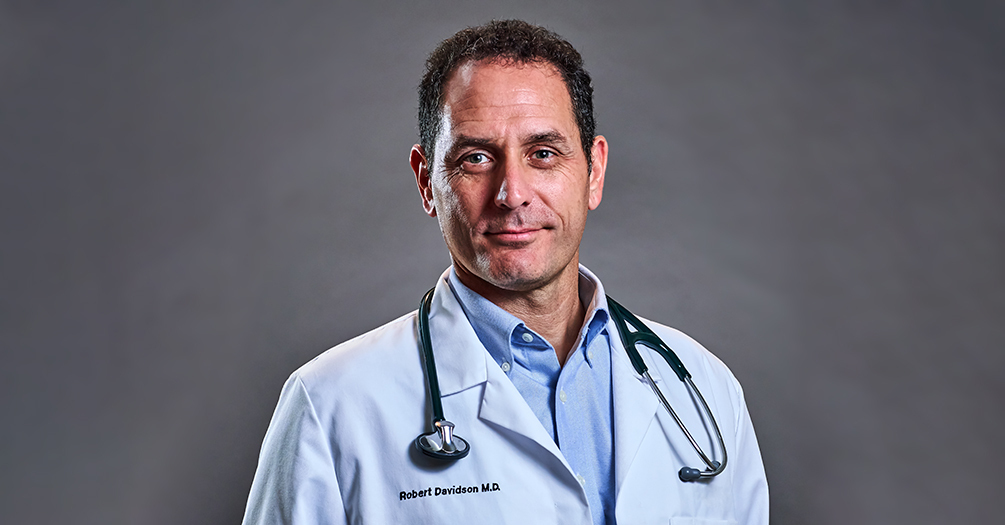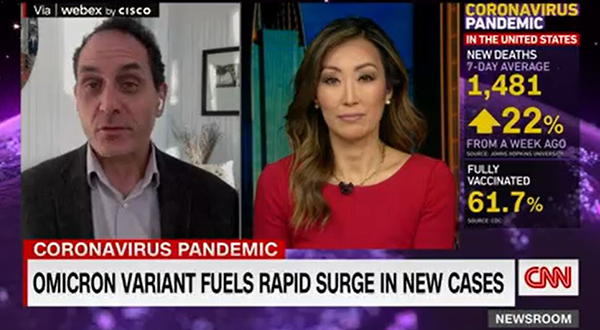Beyond the ER: Using public health and advocacy to be a better doctor

Rob Davidson
Master’s Student, Online Population and Health Sciences Degree Program; Emergency Medicine Physician; Executive Director, Committee to Protect Healthcare
Nearly 25 years as an emergency medicine physician has provided Dr. Rob Davidson with a wealth of knowledge in practicing health care.
Two years ago, however, he decided that he needed more. He began pursuing a Master of Public Health degree in the online Population and Health Sciences program at the University of Michigan School of Public Health.
“I've always been right at that point of health care where you meet people at significant moments in their life,” said Davidson, a West Michigan-based physician. “The ER seems far removed from the goals of population health and public health, but you come to realize just how much people’s wider world has an impact on what brought them to the ER at that point in time.”
Davidson pondered earning his master’s degree for a while, having seen colleagues who earned their MPH go on to impact local health outcomes.
When the COVID-19 pandemic hit, he knew that pursuing an MPH was the right next step.
The last two years of the pandemic have been a significant moment in my career as an ER doctor.
“The pandemic upped the ante on why having a foundation in public health and population health was important,” Davidson said. “It would help me be a better physician and a better advocate as well.”
Davidson began his master’s program just months into the pandemic while working on the front lines in rural Michigan.
“The last two years of the pandemic have been a significant moment in my career as an ER doctor," he said. "The pandemic has been quite a stressor on the whole health care system."
Like other medical professionals, Davidson witnessed the impact of misinformation, vaccine hesitancy, and limited resources.
“Misinformation like this is something I've never experienced,” he said. “When you tell someone they have a heart attack, they accept they have a heart attack and they accept the treatment for it.”
Davidson said the politicization of COVID-19 has been the one of most stressful aspects
of the pandemic.
“It’s strange and so frustrating,” he said. “It’s led to a lot of burnout in health care.”
Despite these added challenges, the second-year MPH student decided it was important to carry-on studies throughout.
“I'm a typical type-A personality,” he said. “The more I have to do, the more effective I am at the things I do. I believe in the importance of getting this education.”
My reality as a physician is, every day I am advocating for someone.
In addition to being a full-time ER physician and graduate student, Davidson is a passionate advocate for health care access. When he’s not in the hospital or in virtual classes, he's writing, speaking, tweeting, and organizing. He has built a following by sharing his expertise and passion.
“My reality as a physician is, every day I am advocating for someone,” he said. “It could be that they can't afford their insulin and you need to find a workaround, or they don't have a primary care doctor and they need help finding someone. Advocacy is always there.”
He was inspired to take action after the 2016 election and subsequent policy changes that he believed would be harmful for many of his patients. He went as far as running for a seat in the US House of Representatives before the pandemic, and even though he didn’t win, it opened up opportunities to do the work in which he’s passionate.
His hard work didn’t go unnoticed as he was soon asked to advocate for the Affordable Care Act in 2017 by the health care advocacy group Committee to Protect Healthcare.
The group has since grown into a collective of more than 7,000 doctors across 14 states, with Davidson now serving as its executive director.
“The mission is affordable health care for all Americans,” Davidson said. “We advocate for people who are out there creating policies that benefit our patients and for policies that benefit our patients.”
An important aspect of this work is public awareness, which has led Davidson to develop his voice as a tireless advocate. He has been published in the likes of the New York Times, been a contributor on various podcasts and national news programs, and has built a following of nearly 90,000 Twitter followers. A chance encounter with Vice President Mike Pence in 2020 went viral after the two tangled over planned cuts to federal Medicaid funding.

Dr. Rob Davidson discusses vaccines and his experience in the ER on CNN in 2021. (Image source: CNN.com)
The pandemic has been front and center for Davidson and his work with the Committee to Protect Healthcare, but the group has taken up other public health concerns such as vaccination policies.
Davidson said the combination of his public health education and medical training background puts him in a special position to help others.
“Public health education has helped me with things like working with coalitions,” he said. “Nothing in public health happens in silos, and in the advocacy world that’s absolutely true. That's been another benefit of doing this degree work side-by-side with my advocacy work.”
And so far, his public health education hasn’t just benefited him. Peers in the online master’s program often cite Davidson and the experience that he brings to class as being a benefit to the program. Though that wasn’t his intention, he agrees that the exchange of professional knowledge in the cohort has been an asset.
“I feel the same way they do: My classmates have taught me so much and brought so much to my clinical and advocacy work and will enrich the work I’m able to do in the future,” he said.
Davidson said his cohort has helped him cultivate a stronger understanding around health care equity issues.
“I have learned a lot about equity from my classmates and the work they do,” he said. “It’s an area where I probably have had a blind spot, as much as I want to know and learn. Being in this program has really accelerated my ability to learn those things.”
Davidson is set to graduate this spring and is looking forward to getting to meet his classmates in person.
“It's been this kind of a team effort,” he said, “and I'm just excited to hang out with them and to toast to us and to the people who run the program.”

